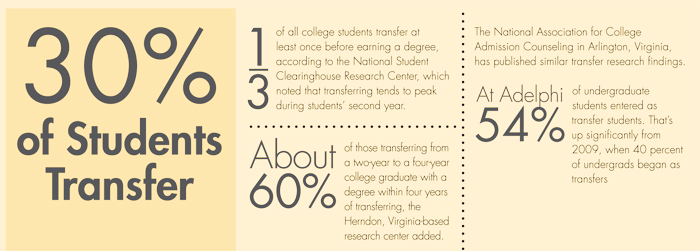James Hoyt talks about what you should know about the transfer process.
by James Hoyt, Ph.D.
Use Your Five Senses
Each year, about 3,000 students graduate from Nassau Community College (NCC) with their associate degrees. A large number of those graduates go on to four-year institutions. That means our Transfer Counseling Office gets lots of traffic—and lots of questions. Whenever I speak with these students, I encourage them to use their five senses in navigating the transfer process. What are these senses, and how do you use them?
- A sense of self—What you want to study and where you want to do it are among the most difficult questions to answer when thinking about transferring. Besides your major, do you want a SUNY school, a CUNY school or a private school? How far away do you want to go? Urban or rural? Will you do better in a small-school environment or are you looking for all the resources and opportunities that a large university will offer.
- A sense of responsibility—It is your decision. You should get advice from faculty, counselors, friends, your parents and others—but, ultimately, the choice is yours.
- A sense of excitement—It is natural to be a little nervous about the transfer process. You have grown very comfortable at your present institution. Research has shown that you will be welcomed at your next institution and that you will do just fine academically. Take some chances! Don’t automatically accept self-imposed limitations, such as the academic difficulty or overall cost of attending an institution. You may be pleasantly surprised. The application process itself can be a wonderful learning experience if it makes you really think about what you are looking for at your next institution.
- Common sense—Pay attention to application deadlines. Many institutions have rolling admissions deadlines for some programs, but other programs may be very competitive. Make sure to send transcripts from every institution you have attended and a final transcript from your last institution, with your degree posted on it, if appropriate. Make sure you visit the institutions you are considering. Be sure to complete the Free Application for Federal Student Aid (FAFSA).
- Dollars and sense—Don’t let cost be your only guide. Many private institutions will offer generous scholarships based on your grade-point average and other factors. Transfer students have become an increasingly important population in higher education over the past three decades. Students are getting the attention and services they deserve and the process has become easier now that most institutions have dedicated transfer admissions counselors and, often, offices of transfer services, as well as articulation agreements, scholarships and the like.
The key to making the process work better is getting your associate degree. While most institutions will accept students before they finish the degree, credits will transfer better, general education requirements may be met and you may be eligible for additional scholarships if you complete the associate degree.

James Hoyt, transfer coordinator in NCC’s Transfer Counseling Office since 2011 and transfer counselor before that, said he developed the five senses approach to transfer during his 30- plus years at NCC. Dr. Hoyt, who earned a Ph.D. from New York University, is also an adjunct mathematics professor at the community college.
For further information, please contact:
Todd Wilson
Strategic Communications Director
p – 516.237.8634
e – twilson@adelphi.edu